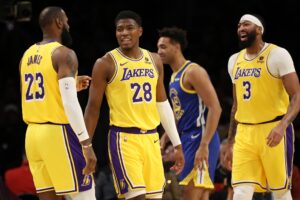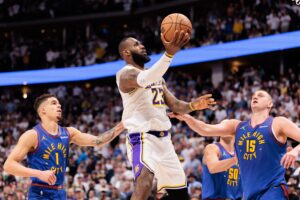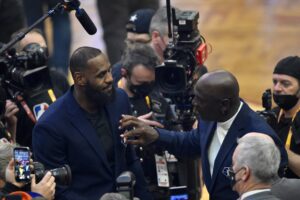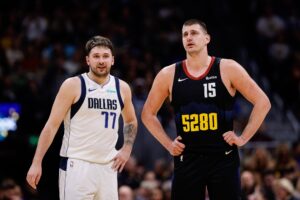Jerry Seinfeld has a great take-down of the American sports fan’s ethos. Our allegiance to professional athletes requires them to wear the jersey and logo of our liking. To jump off Seinfeld’s point, it’s funny that – even as grown men – we choose the clothes over the bros. Most times, what’s on the front of the jersey dictates either one of two extremes: love and hate (for lack of a better phrase). The fact that, in many cases, it can be one or the other, is really quite unfortunate. Or even worse, it can be pretty much all hate. That’s when fun and games can become toxic. It’s fine to root for your team, but it’s not fine to excuse a fundamental lack of respect for an athlete because he doesn’t play for your team. Eric Gordon survived the toxicity, and Eric Gordon’s shot at redemption comes this season.
Eric Gordon’s Shot at Redemption
We should all be rooting for Eric Gordon this season, just out of respect for him. He deserves a chance to make good on a once-promising NBA career. (How can you not root for a guy who’s an unabashed Scooby Doo fan and is nicknamed “The Hobbit,” right?) There is a sect of fans that’s probably too far gone to see these things from a more humanist perspective than from that of a sports analyst, and that’s too bad. That’s not to say that everybody should stop rooting for their team. Rather, it’s merely to suggest we can root for our team and still see athletes as human beings. You know, keep things in their proper context. So let’s examine the trials and tribulations of one Eric Gordon with that in mind.
When the World was His
As the reigning “Mr. Basketball” in Indiana, Gordon chose to stay close to home and play college ball at Indiana University (he was born in Indianapolis). Choosing where to play in college would prove to be the last time he would have the ability to make such a decision for a very long time.
Moreover, in Gordon’s case, one could assume that if asked when basketball was the most fun for him, he’d say playing in college without hesitation. During his stay, Gordon was one of the best players in the nation, and was Indiana’s “big man on campus”. His efforts were enough to make him the seventh overall pick in the 2008 NBA Draft, taken by the Los Angeles Clippers.
Early Days in the NBA
One of the consequences of the draft is that it puts players in situations that aren’t well-suited for them. Which is to say: a perfect match of player and situation is rare. Gordon was no exception. For his first two years, the Clippers were the stereotypical Clippers – the doormat of the NBA’s Western Conference.
In each of his first three seasons, Gordon’s scoring increased. The numbers he put up during the 2010-11 season in per-game averages of points (22.3), assists (4.4), and rebounds (2.9) all remain career highs. He was 22 years old that season. It would have been safe to assume that he was going to get better. He didn’t.
Likewise, the Clippers’ win total went up in each of those years – going from 19 to 29 to 32. But Eric Gordon’s shot to see the light at the end of the tunnel in Los Angeles was eclipsed in the form of the Chris Paul trade.
“Lob City” Came at a Cost
Teams have to give up something to get something. When the Clippers acquired Chris Paul from the New Orleans Pelicans, it came at the cost of Eric Gordon (among other assets). In the video of DeAndre Jordan and Blake Griffin declaring the inception of “Lob City,” it would stand to guess that Gordon was in the vicinity of his teammates … watching them openly celebrate his exit (albeit indirectly).
Given the expectations, Gordon’s time in New Orleans was nothing short of a failure. Up until last season, Gordon’s numbers decreased in each year after joining the Pelicans. His efficiency numbers plummeted. With the Pelicans, Eric Gordon’s shot became about as effective as cutting a steak with a plastic spork.
Graphically, his career though six seasons would make a perfect bell curve (up, up, up, then down, down, down). While injuries certainly played a major factor in his performance, it’s not ordinary to see such a talented player peak at 22, then seemingly approach complete write-off status by the age of 26. However, talk of Gordon’s demise is greatly exaggerated.
$58 Million Doesn’t Buy Happiness
It would be easy to argue that the money should make the pain go away, at least to some extent. But not only is that wholly unfair to Gordon (or whomever you may be talking about), it’s a really irrational and cold-hearted way to look at the world.
(Think about it: it is the suggestion that rich people don’t experience human emotions the way the less wealthy do. Tying human emotion – or a lack thereof – to money is pretty ridiculous. It also ignores a basic tenet of the great philosopher Notorious B.I.G. Good luck telling Mark Cuban that his money should make it more bearable to tolerate his Dallas Mavericks‘ losses.)
The Universe Turned Against Him
In 2012, Eric Gordon entered restricted free agency. He signed an offer sheet from the Phoenix Suns for $58 million over four years. Reports at the time (per Yahoo!) were that Gordon badly wanted out of New Orleans, and asked management not to match the Suns’ offer, allowing him to go to Phoenix. In the same report, Gordon described how his relationship with the then-New Orleans Hornets management soured, and how he felt wronged (whether he was right is up to interpretation).
With this information going public, along with Gordon’s sub-par performance and inability to stay on the court, he became a pariah. He consistently landed on “The NBA’s Worst Contracts” articles and lists. To add insult to injury (in the most literal sense), he didn’t even get the “luxury” of the support of his home crowd. Like most NBA fans, most fans in New Orleans saw him as an overpaid, under-performing, injury-riddled lost cause.
Landing in Houston: A Home Awaits
After entering the draft and ceding control of where he played, after getting traded to a place he probably didn’t want to go to in the first place, after attempting to leave and having that attempt blocked, Eric Gordon’s shot at finding a place to call home on his terms finally came. His contract expired, and this past free agency period allowed Gordon to dictate his future. In a larger and symbolic sense, Gordon’s case represents a situation that seldom gets attention. Each NBA player runs his own business. And his business is his ability.
In almost all other circumstances outside of sports, people can operate their business where they want. From age 18 to 27, Eric Gordon had no say in where he set up his business. No amount of money can make up for constricting one’s freedom in regards to where one sets up shop, especially when people are in the top one percent of their profession. However, many players sacrifice that right in order to play professional basketball. But even within that context, Gordon is still a bit of a unique case.
There are few players who deserve to have their careers divided into such different and distinct chapters as Gordon. As far as what was expected of him coming out of Indiana, he’ll probably never to live up to that. But playing in Houston, alongside James Harden and in Mike D’Antoni’s up-tempo system, offers the foundation for Gordon to put together a very respectable NBA career. Eric Gordon’s shot at becoming a version of the player he was supposed to be is at his doorstep. We will all get to watch it in real-time, and we should all root for him. We should hope it ends up being a redemption story.
Main photo:
February 27, 2015 – New Orleans Pelicans guard Eric Gordon (10) during the game between the New Orleans Pelicans and the Miami Heat at Smoothie King Center in New Orleans, LA. New Orleans Pelicans defeat the Miami Heat 104-102. (Photo by Stephen Lew/Icon Sportswire/Corbis via Getty Images)






